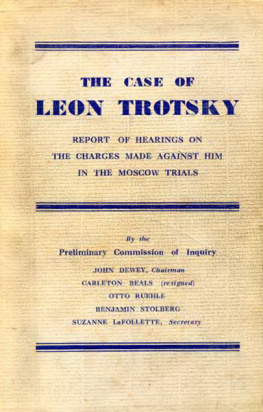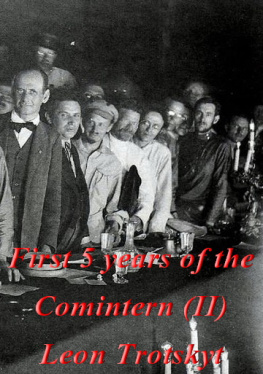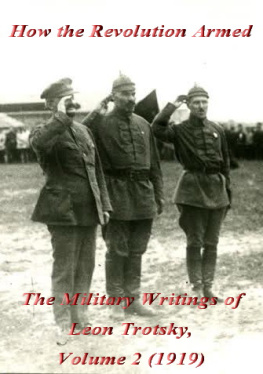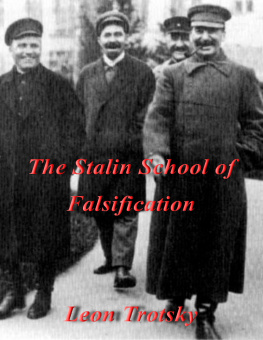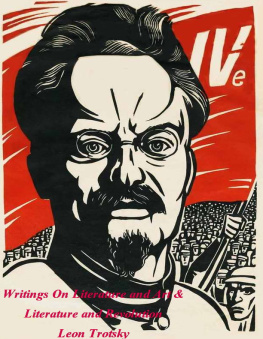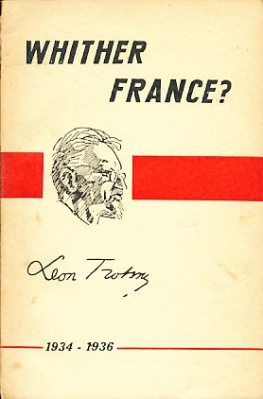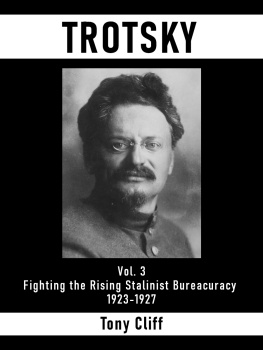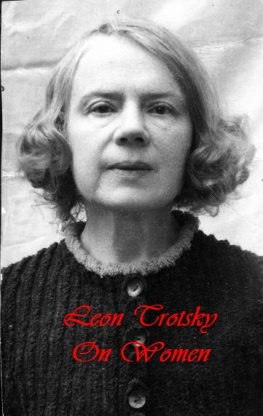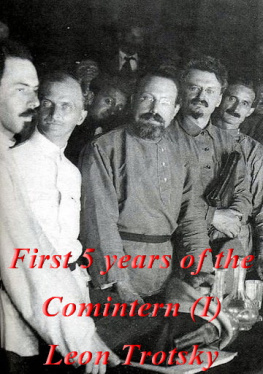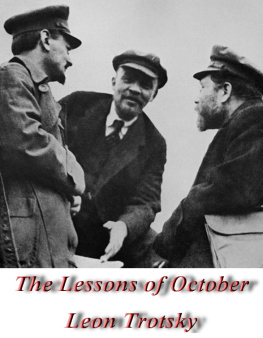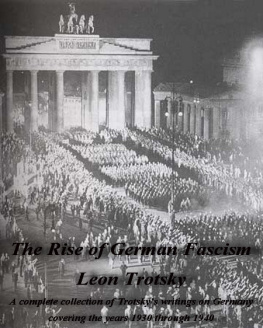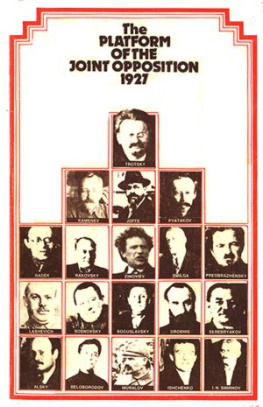Trotsky - The New Course
Here you can read online Trotsky - The New Course full text of the book (entire story) in english for free. Download pdf and epub, get meaning, cover and reviews about this ebook. year: 1923, publisher: Marxists Internet Archive, genre: Science. Description of the work, (preface) as well as reviews are available. Best literature library LitArk.com created for fans of good reading and offers a wide selection of genres:
Romance novel
Science fiction
Adventure
Detective
Science
History
Home and family
Prose
Art
Politics
Computer
Non-fiction
Religion
Business
Children
Humor
Choose a favorite category and find really read worthwhile books. Enjoy immersion in the world of imagination, feel the emotions of the characters or learn something new for yourself, make an fascinating discovery.
The New Course: summary, description and annotation
We offer to read an annotation, description, summary or preface (depends on what the author of the book "The New Course" wrote himself). If you haven't found the necessary information about the book — write in the comments, we will try to find it.
Transcribed, scanned & HTML markup for the Trotsky
Internet Archive by David Walters in 1996 and 1999.
Converted to eBook format by Kollektiv Yakov Perelman, from
the on-line version of The New Course (1923) available at Trotsky Internet Archive in June
2013.
The New Course — read online for free the complete book (whole text) full work
Below is the text of the book, divided by pages. System saving the place of the last page read, allows you to conveniently read the book "The New Course" online for free, without having to search again every time where you left off. Put a bookmark, and you can go to the page where you finished reading at any time.
Font size:
Interval:
Bookmark:
The Question of the Party Generations
N one of the resolutions adopted during the discussion inMoscow, the complaint is made that the question of party democracy has been complicated bydiscussions on the relationships between the generations, personal attacks, etc. This complaintattests to a certain mental confusion. Personal attacks and the mutual relationships betweengenerations are two entirely different things. To pose now the question of party democracy withoutanalyzing the membership of the party, from the social point of view as well as from the point ofview of age and political standing, would be to dissolve it into a void. It is not by accident thatthe question of party democracy rose up first of all as a question of relationships between thegenerations. It is the logical result of the whole evolution of our party. Its history may bedivided schematically into four periods:
- quarter of a century of preparation up to October, the only one in history;
- October;
- the period following October; and
- the new course, that is, the period we are now entering.
Despite its richness, its complexity and the diversity of the stages through whichit passed, the period prior to October, it is now realized, was only a preparatory period. Octobermade it possible to check up on the ideology and the organization of the party and its membership.By October, we understand the acutest period of the struggle for power, which can be said to havestarted approximately with Lenins April Theses and ended with the actual seizure of the state apparatus. Even though it lasted only afew months, it is no less important in content than the whole period of preparation which ismeasured in years and decades. October not only gave us an unfailing verification, unique in itskind, of the partys great past, but it itself became a source of experience for the future.It was through October that the pre October party was able for the first time to assess itself atits true worth.
The conquest of power was followed by a rapid, even abnormal, growth of the party. A powerfulmagnet, the party attracted not only workers with little consciousness, but even certain elementsplainly alien to its spirit: functionaries, careerists and political hangers on. In this chaoticperiod, it was able to preserve its Bolshevist nature only thanks to the internal dictatorship ofthe Old Guard, which had been tested in October. In the more or less important questions, theleadership of the older generation was then accepted almost unchallenged by the new members, notonly by the proletarian ranks but by the alien elements. The climbers considered this docility thebest way of establishing their own situation in the party. But they miscalculated. By a rigorouspurging of its own ranks, the party rid itself of them. Its membership diminished, but itsconsciousness was enhanced. It may be said that this checkup on itself, this purge, made thepost-October party feel itself for the first time a half million headed collectivity whose task wasnot simply to be led by the Old Guard but to examine and decide for itself the essential questionsof policy. In this sense, the purge and the critical period linked with it are the preparation, asit were, of the profound change now manifesting itself in the life of the party and which willprobably go down in its history under the name of the new course.
There is one thing that ought to be clearly understood from the start: the essence of thepresent disagreements and difficulties does not lie in the fact that the secretarieshave overreached themselves on certain points and must be called back to order, but in the factthat the party as a whole is about to move on to a higher historical stage. The bulk of thecommunists are saying in effect to the leaders: You, comrades, have the experience of beforeOctober, which most of us are lacking; but under your leadership we have acquired after October agreat experience which is constantly growing in significance. And we not only want to be led by youbut to participate with you in the leadership of the class. We want it not only because that is ourright as party members but also because it is absolutely necessary to the working class as a whole.Without our modest experience, experience which should not merely be taken note of in the leadingspheres but which must be introduced into the life of the party by ourselves, the leading partyapparatus is growing bureaucratic, and we, rank-and-file communists, do not feel ourselvessufficiently well armed ideologically when confronting the non party people. The presentchange is, as I have said, the result of the whole precedent evolution. Invisible at first glance,molecular processes in the lift and the consciousness of the party have long been at work preparingit. The market crisis gave a strong impetus to critical thought. The approach of the events inGermany set the party a quiver. Precisely at this moment it appeared with particular sharpness thatthe party was living, as it were, on two storeys: the upper storey, where things are decided, andthe lower storey, where all you do is learn of the decisions. Nevertheless, the critical revisionof the internal rgime of the party was postponed by the anxious expectation of what seemedto be the imminent showdown in Germany. When it turned out that this showdown was delayed by theforce of things, the party put the question of the new course" on the order of theday.
As often happens in history, it is precisely during these last months that the oldcourse revealed the most negative and most insufferable traits: apparatus cliquism,bureaucratic smugness, and complete disdain for the mood, the thoughts and the needs of the party.Out of bureaucratic inertia, it rejected, from the very beginning, and with an antagonisticviolence, the initial attempts to put on the order of the day the question of the critical revisionof the internal party rgime. This does not mean, to be sure, that the apparatus is composedexclusively of bureaucratized elements, or even less, of confirmed and incorrigible bureaucrats.Not at all! The present critical period, whose meaning they will assimilate, will teach a good dealto the majority of the apparatus workers and will get them to abandon most of their errors. Theideological and organic regrouping that will come out of the present crisis, will, in the long run,have healthful consequences for the rank and file of the communists as well as for the apparatus.But in the latter, as it appeared on the threshold of the present crisis, Bureaucratism has reachedan excessive, truly alarming development. And that is what gives the present ideological regroupingso acute a character as to engender legitimate fears.
It will suffice to point out that, two or three months ago, the mere mention of theBureaucratism of the apparatus, of the excessive authority of the committees and the secretaries,was greeted by the responsible representatives of the old course, in the central andlocal organizations, with a shrug of the shoulders or by indignant protestations. Appointment as asystem? Pure imagination! Formalism, Bureaucratism? Inventions, opposition solely for the pleasure of making opposition, etc. These comrades, in all sincerity, did not notice thebureaucratic danger they themselves represent. It is only under pressure from the ranks that theybegan, little by little, to recognize that there actually were manifestations of Bureaucratism, butonly somewhere at the organizational periphery, in certain regions and districts, that these wereonly a deviation in practice from the straight line, etc. According to them, Bureaucratism wasnothing but a survival of the war period, that is, a phenomenon in the process of disappearing,only not fast enough. Needless to say how false are this approach to things and this explanation.Bureaucratism is not a fortuitous feature of certain provincial organizations, but a generalphenomenon. It does not travel from the district to the central organization through the medium ofthe regional organization, but much rather from the central organization to the district throughthe medium of the regional organization. It is not at all a survival of the warperiod; it is the result of the transference to the party of the methods and the administrativemanners accumulated during these last years. However exaggerated were the forms it sometimesassumed, the Bureaucratism of the war period was only childs play in comparison with presentday Bureaucratism which grew up in peacetime, while the apparatus, in spite of the ideologicalgrowth of the party, continued obstinately to think and decide for the party.
Font size:
Interval:
Bookmark:
Similar books «The New Course»
Look at similar books to The New Course. We have selected literature similar in name and meaning in the hope of providing readers with more options to find new, interesting, not yet read works.
Discussion, reviews of the book The New Course and just readers' own opinions. Leave your comments, write what you think about the work, its meaning or the main characters. Specify what exactly you liked and what you didn't like, and why you think so.



